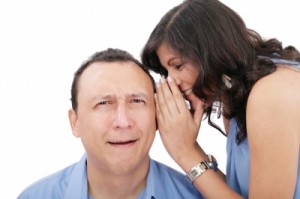 Talking and listening is fundamental to any relationship. It sounds simple to say that a conversation involves both speaking and listening, but all-too-often our conversations involve a form of competition as we seek the power that comes through speaking. We have learnt how to speak, but we have not necessarily learnt how to listen. Yet we all need to be heard and understood and there is nothing more hurtful than realizing that the people close to us aren’t really listening to what we have to say.
Talking and listening is fundamental to any relationship. It sounds simple to say that a conversation involves both speaking and listening, but all-too-often our conversations involve a form of competition as we seek the power that comes through speaking. We have learnt how to speak, but we have not necessarily learnt how to listen. Yet we all need to be heard and understood and there is nothing more hurtful than realizing that the people close to us aren’t really listening to what we have to say.
In my previous article, I argued that listening is a skill that we need to learn. I suggested that listening is about showing respect and empathy for the other person in such a way that they will feel able to communicate more of what is really going on. Good listening opens up the conversation, rather than closing it down by offering quick solutions. In this article, I continue that discussion by suggesting some more concrete ways in we can develop listening skills that further a real communication.
Develop Your Active Listening Skills
As I mentioned before, listening with respect involves drawing out thoughts and information that can open up the conversation. In such active listening, it is important to seek clarification and to give feedback. Try to ask questions, such as asking the speaker to give an example or to explain what they are trying to communicate. Try to respond, or else to paraphrase what you have heard. For example, you could ask: “Are you saying such and such?” or, “I heard you say this. Is this what you meant?” Make sure that you have good eye contact with the speaker, nod your head, or make some other kind of bodily gesture to let them know that you are listening. In other words, do whatever is necessary to let the speaker know that you are listening and that you have understood what they are trying to communicate.
Be Aware of Non-Verbal Communication
 Some scholars have estimated that 75 percent of all our communication occurs non-verbally. Beyond the words that we use, we can find a host of clues as to what the speaker is seeking to communicate. Every day we respond to thousands of non-verbal cues and behaviors which include posture, facial expression, eye gaze, gesture and tone of voice. From our handshake to our attire, our non-verbal communication reveals who we are and how we relate to other people. To be an effective listener requires noticing everything that the speaker is communicating, both verbally and non-verbally.
Some scholars have estimated that 75 percent of all our communication occurs non-verbally. Beyond the words that we use, we can find a host of clues as to what the speaker is seeking to communicate. Every day we respond to thousands of non-verbal cues and behaviors which include posture, facial expression, eye gaze, gesture and tone of voice. From our handshake to our attire, our non-verbal communication reveals who we are and how we relate to other people. To be an effective listener requires noticing everything that the speaker is communicating, both verbally and non-verbally.
Observe How People Listen
It can be a helpful exercise to observe both your own listening habits and those of others. Notice how you feels when people really listen to you, and contrast this to how you feel when others don’t listen. Make a note of the behaviors that you find irritating in others, and then examine your own listening behavior to see if you exhibit some of the behavior that you find annoying in others. It can help you to understand the personal filters and triggers that we bring to a conversation if you approach it with a mindset that is open to growth and change. Each one of us is a product of our up-bringing, culture and life experience, and our uniqueness can sometimes be an obstacle to being an effective listener. By identifying and reducing that which gets in the way of your ability to hear the other, you can increase your effectiveness as a listener.
Christian Counseling Can Help You to Become a Better Listener
We all need to feel that we are being heard and understood. This is a basic human need and is as essential as food or water is to our survival. The Greek philosopher Epictetus said, “Nature gave us one tongue and two ears, so we can hear twice as much as we speak.” Yet listening is a skill that often needs to be learnt. I suggest that you try out the suggestions that I have made in these articles and see if your communication and relationships improve. However, if you feel that you need more expert assistance in developing your listening skills, a professional Christian counselor can provide valuable help. I would be honored to work with you and your spouse, or with your larger family.
Photos
Images from freedigitalphotos.net; “Man With Hands Over Ears” Stock Photo by David Castillo Dominici; “Beautiful Brunette Woman Whispering Into Her Boyfriends Ear” Stock Photo by David Castillo Dominici





